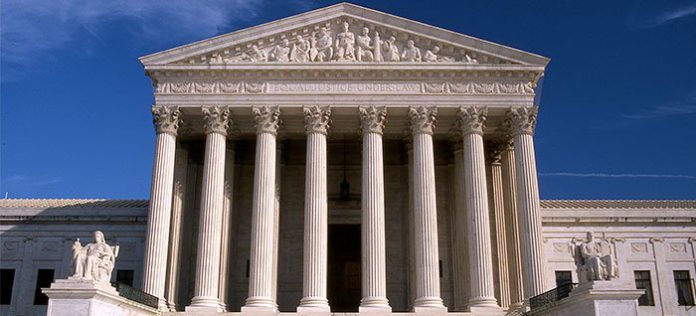
The Supreme Court on Monday and Wednesday heard closely watched cases that raise First Amendment claims involving state authority to collect information about nonprofit organization donors. The justices discussed concerns about confidentiality and probed lawyers about the implications of a ruling for political organizations.
In two cases filed by Americans for Prosperity and Thomas More Law Center, some justices appeared willing to consider extending to many nonprofit, tax-exempt entities a Civil Rights Movement era case that shields donors to to nonprofits in some circumstances from California’s reporting requirements. The 60 year-old precedent has been used to protect political activists at risk of physical harm inflicted by governments.
“This demand casts a profound nationwide chill, and it does so for no good reason,” said Derek Shaffer of Washington, D.C.- based Quinn Emanuel Urquhart & Sullivan, in his April 26 argument on behalf of AFP. The edict, he said, amounts to an “upfront suspicionless demand” that does not justify the “First Amendment intrusions” that come along with it.
Justice Elena Kagan seemed unsure whether the desire of some donors to keep their identities secret was a consideration that the court should apply in all cases. She noted “that a very substantial majority of donors in a very substantial majority of charities are not concerned about that” and “rather like public disclosure of their generosity.” With that in mind, she wondered whether the court should instead address only whether application of the California dictate unconstitutionally harms the parties challenging it or, instead, if the court must decide whether requiring those disclosures would always violate the First Amendment. Shaffer insisted on the latter.
Justice Brett Kavanaugh asked acting solicitor general Elizabeth Prelogar whether the paucity of states that collect nonprofit donor information means that California’s requirement fails First Amendment examination. Prelogar, who argued on AFP and Thomas More Law Center’s side to a limited degree, said it would not. “I don’t think it could possibly be the case that California’s law could be invalid just based on that kind of headcount,” she said. “Obviously, states in our federalist system can choose to devote different levels of resources to problems. They can choose to regulate in different ways and have different priorities.”
Several Republican-appointed justices appeared ready to delve into the question of whether donors to politically active organizations face threats to their safety and, therefore, whether their identities should be shielded from government. “In this era, there seems to be quite a bit of loose accusations about organizations,” Justice Clarence Thomas said. “For example, an organization that had certain views might be accused of being a white supremacist organization or racist or homophobic.” Justice Samuel Alito spoke of “vandalism, death threats, physical violence, economic reprisals, [and] harassment in the workplace” that had been allegedly directed at anti-LGBTQ activists, while Justice Neil Gorsuch twice warned that donors’ “holiday card list” or “a list of the people they’ve dated” might be subject to a reporting mandate.
Justices also showed concern for the collateral damage that the case might have for the nation’s campaign finance system. “If you win in this case, I think the court will have in some form held that the interest of the donors in maintaining privacy of their giving to a charity [and the] interests of the charity in receiving [the] money … outweighs the interest of the state in having a law on the books that, even if it never is actually enforced, frightens people into behaving properly,” said Justice Stephen Breyer. “If we hold that, can we distinguish campaign finance laws, where the interest is even stronger in people being able to give anonymously?”
Justice Sonia Sotomayor, too, pointed out that the court has traditionally upheld rules requiring donor disclosure. “If we were to apply the type of narrow tailoring you advocate, I don’t see how the public disclosure at issue in Doe would have survived,” she said, referring to the court’s 2010 decision in Doe v. Reed. In that ruling, eight justices agreed that the First Amendment does not invalidate statutory requirements to disclose donors to political campaigns. Shaffer said his clients were not attacking that holding, arguing that the “electoral context” is a distinctive public policy situation.
Doug Spencer, a professor at the University of Connecticut School of Law and a fellow at the University of Colorado Law School’s Byron R. White Center for the Study of American Constitutional Law, pointed out that the concerns voiced by conservative justices were in sharp contrast to a 2010 opinion written by the late Justice Antonin Scalia, an appointee of President Ronald Reagan celebrated in conservative circles for his devotion to an originalist view of constitutional interpretation. “Requiring people to stand up in public for their political acts fosters civic courage, without which democracy is doomed,” Scalia wrote in a 2010 concurring opinion in Doe. “For my part, I do not look forward to a society which, thanks to the Supreme Court, campaigns anonymously … and even exercises the direct democracy of initiative and referendum hidden from public scrutiny and protected from the accountability of criticism. This does not resemble the Home of the Brave.”
No matter the extent to which the justices take into account the risks that may accompany political activism or financial support of causes and candidates, Spencer thinks the court will avoid addressing the implications of the dispute for campaign finance regulation. “I think the big distinction is the state’s interest,” he said. “In the current case, they’re trying to make sure that the charities that are operating in their state aren’t violating the law or engaged in fraud. That’s different [from] the state’s interest in disclosure for campaign finance.”
The cases are Americans for Prosperity Foundation v. Bonta, No. 19-251, and Thomas More Law Center v. Bonta, No. 19-255.

